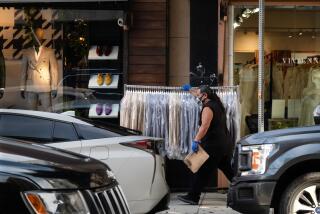DRESS TO SELL : Uniform Suppliers Are Closing Ranks Through Mergers
- Share via
Marching in formation and chanting like Marines, the actors in a new television commercial are trying to advance a message: Cintas, a Cincinnati-based firm that sells and rents uniforms, is on the move.
The commercial is evidence of change in an industry that was traditionally dominated by regional, family-owned enterprises that advertised only in the Yellow Pages and made modest profits by leasing linen to hotels and selling uniforms to factory workers.
While the uniformed actors march across television screens, bigger, public companies such as Cintas are marching into California and other markets and making big profits by selling and leasing uniforms to businesses in the rapidly growing service sector.
“The industry is in the throes of an active consolidation,” said Elliot Schlang, an analyst at the investment firm of Prescott Ball. “A consolidation may make small and regional firms obsolete.”
Ironically, the consolidation has accelerated just as service-oriented businesses--the biggest users of uniforms--have expanded. Part of that service expansion--the rapid growth of restaurant franchises and hotel and store chains--has been a boon to national companies with the resources to meet very large orders for uniforms.
And, some publicly traded companies have used revenues from those big contracts to acquire private, regional uniform providers, thus enabling them to capture even more of the market, according to analysts. But some larger privately owned firms, such as Gardena-based Barco of California and Encino-based Aratex Services, have still managed to thrive as the size of big contracts has increased.
Use Is Spreading
The industry, with estimated annual revenues of $2 billion nationwide, is composed of manufacturers, sellers and leasers of “career apparel,” as the industry calls uniforms, worn by 23 million Americans--among them mechanics, police officers, waitresses, delivery workers and nurses.
These days, however, customers also include other businesses--banks and real estate firms, for example--that have not traditionally required uniforms. As more white-collar operations make the switch to company blazers and other customized clothing resembling uniforms, the market expands.
“The demand is growing,” said Jeanine Heller, an analyst at Stifel Nicolaus. “Even drivers of beverage trucks are wearing uniforms. T-shirts and blue jeans aren’t enough.”
Uniform industry sales have climbed about 7% annually during the past five years, according to a recent Cintas study. The company has three stores in California--Pico Rivera, San Diego and Oakland--and 45 other stores in 20 states.
Cintas’ success mirrors the industry’s recent growth: Revenues have climbed from $63 million in 1983 to $204 million in the fiscal year ended last May 31, 1988, and earnings have risen from $5.4 million to $17.2 million for the same periods.
Because many of the uniform companies are still private, it’s impossible to get precise market share information. But Aratex, a subsidiary of giant ARA Services in Philadelphia, is generally considered to be the leader in the blue-collar uniforms. Aratex reduced its field of competitors in late 1986 by acquiring Servisco, based in Hillside, N.J., which also specialized in work clothing for blue-collar industries.
Acquired Many firms
In addition to Cintas, other big publicly owned uniform companies include St. Louis-based Angelica Corp., a leader in health-care apparel, and Unifirst of Woburn, Mass.
Much of Cintas’ growth has been the result of acquisitions. The company has been acquiring local and regional firms at a torrid pace--12 in the last five years. It established a presence in the huge California market by acquiring Los Angeles-based Certified Uniform Rental in 1983.
“California is an important market, and we’re committed to expanding our presence there,” Carnahan said.
Others who obviously view California as a growth area include Minneapolis-based G&K; Services, which signed an agreement last July to purchase Los Angeles-based Calstate Towel & Uniform Service, with annual revenue of $4.7 million. That deal represented G&K;’s first entry into Southern California, augmenting its operations in San Francisco, Sacramento and San Jose.
As the bigger firms take an increasing share of the market, the smaller, family-owned firms that were the industry’s traditional mainstays will find it more difficult to compete because capital costs are rising, said Thomas Postek, an analyst with the investment firm of William Blair. In the uniform rental business, for example, the price of washing machines and the cost of treating laundry waste water is rising, Postek said.
Michael Donner, president of family-owned Barco of California, predicts that consolidation in the industry will continue partly because major customers--grocery chains, hotels and restaurant chains--have also been consolidating through mergers. When the number of customers is reduced--even as demand for uniforms increases, survival of smaller competitors grows more difficult, he said.
Still Family Owned
Barco will survive, he said, because it is one of the dominant companies in the industry. Most of Barco’s business comes from selling health-care and restaurant industry uniforms to uniform stores and corporate clients.
Founded in 1929 by Donner’s great grandfather, Barco is still owned by his family. Donner succeeded his father, Kenneth, as president in 1982.
Los Angeles-based Brookhurst Inc., another long-time Southern California uniform manufacturer, is principally owned by Fred Hailparn and his family, who acquired the company 35 years ago. The company’s clients include some firms involved in air transportation, car rentals and restaurant franchising, according to Nicholas Yacobucci, executive vice president.
“The business has become much more competitive in the past five years, price-wise,” Yacobucci said.
Another local entrepreneur--Ted Banz, president of the Los Angeles-based Sam Cook Uniforms--said his uniform operation may be threatened by the ongoing consolidation. Much of Cook’s business is selling uniforms for police, highway patrol officers and security guards.
“There are some large manufacturers on the East Coast that may move out here,” he said. “It’s something we’re concerned about.”
More to Read
Inside the business of entertainment
The Wide Shot brings you news, analysis and insights on everything from streaming wars to production — and what it all means for the future.
You may occasionally receive promotional content from the Los Angeles Times.










